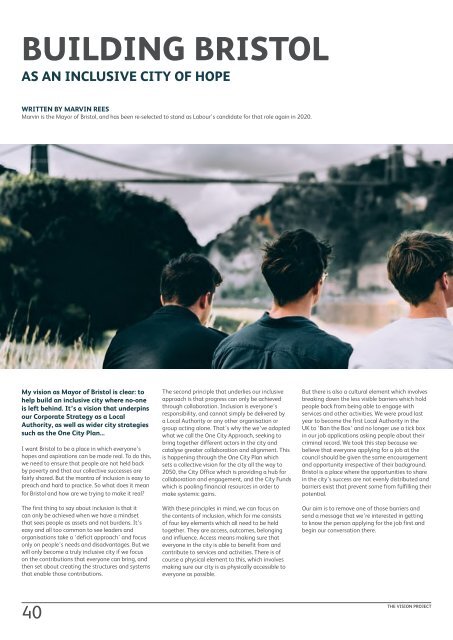The Vision Project
Throughout 2019, Developing Health & Independence (DHI), have been marking their 20th anniversary as a charity by looking to the future. Through articles, events and podcasts, they've asked people to answer the question of how we can achieve their vision of ending social exclusion. This collection of articles includes the contributions of experts from across public life and the political spectrum.
Throughout 2019, Developing Health & Independence (DHI), have been marking their 20th anniversary as a charity by looking to the future. Through articles, events and podcasts, they've asked people to answer the question of how we can achieve their vision of ending social exclusion. This collection of articles includes the contributions of experts from across public life and the political spectrum.
You also want an ePaper? Increase the reach of your titles
YUMPU automatically turns print PDFs into web optimized ePapers that Google loves.
BUILDING BRISTOL<br />
AS AN INCLUSIVE CITY OF HOPE<br />
WRITTEN BY MARVIN REES<br />
Marvin is the Mayor of Bristol, and has been re-selected to stand as Labour’s candidate for that role again in 2020.<br />
My vision as Mayor of Bristol is clear: to<br />
help build an inclusive city where no-one<br />
is left behind. It’s a vision that underpins<br />
our Corporate Strategy as a Local<br />
Authority, as well as wider city strategies<br />
such as the One City Plan...<br />
I want Bristol to be a place in which everyone’s<br />
hopes and aspirations can be made real. To do this,<br />
we need to ensure that people are not held back<br />
by poverty and that our collective successes are<br />
fairly shared. But the mantra of inclusion is easy to<br />
preach and hard to practice. So what does it mean<br />
for Bristol and how are we trying to make it real?<br />
<strong>The</strong> first thing to say about inclusion is that it<br />
can only be achieved when we have a mindset<br />
that sees people as assets and not burdens. It’s<br />
easy and all too common to see leaders and<br />
organisations take a ‘deficit approach’ and focus<br />
only on people’s needs and disadvantages. But we<br />
will only become a truly inclusive city if we focus<br />
on the contributions that everyone can bring, and<br />
then set about creating the structures and systems<br />
that enable those contributions.<br />
<strong>The</strong> second principle that underlies our inclusive<br />
approach is that progress can only be achieved<br />
through collaboration. Inclusion is everyone’s<br />
responsibility, and cannot simply be delivered by<br />
a Local Authority or any other organisation or<br />
group acting alone. That’s why the we’ve adopted<br />
what we call the One City Approach, seeking to<br />
bring together different actors in the city and<br />
catalyse greater collaboration and alignment. This<br />
is happening through the One City Plan which<br />
sets a collective vision for the city all the way to<br />
2050, the City Office which is providing a hub for<br />
collaboration and engagement, and the City Funds<br />
which is pooling financial resources in order to<br />
make systemic gains.<br />
With these principles in mind, we can focus on<br />
the contents of inclusion, which for me consists<br />
of four key elements which all need to be held<br />
together. <strong>The</strong>y are access, outcomes, belonging<br />
and influence. Access means making sure that<br />
everyone in the city is able to benefit from and<br />
contribute to services and activities. <strong>The</strong>re is of<br />
course a physical element to this, which involves<br />
making sure our city is as physically accessible to<br />
everyone as possible.<br />
But there is also a cultural element which involves<br />
breaking down the less visible barriers which hold<br />
people back from being able to engage with<br />
services and other activities. We were proud last<br />
year to become the first Local Authority in the<br />
UK to ‘Ban the Box’ and no longer use a tick box<br />
in our job applications asking people about their<br />
criminal record. We took this step because we<br />
believe that everyone applying for a job at the<br />
council should be given the same encouragement<br />
and opportunity irrespective of their background.<br />
Bristol is a place where the opportunities to share<br />
in the city’s success are not evenly distributed and<br />
barriers exist that prevent some from fulfilling their<br />
potential.<br />
Our aim is to remove one of those barriers and<br />
send a message that we’re interested in getting<br />
to know the person applying for the job first and<br />
begin our conversation there.<br />
40<br />
THE VISION PROJECT




